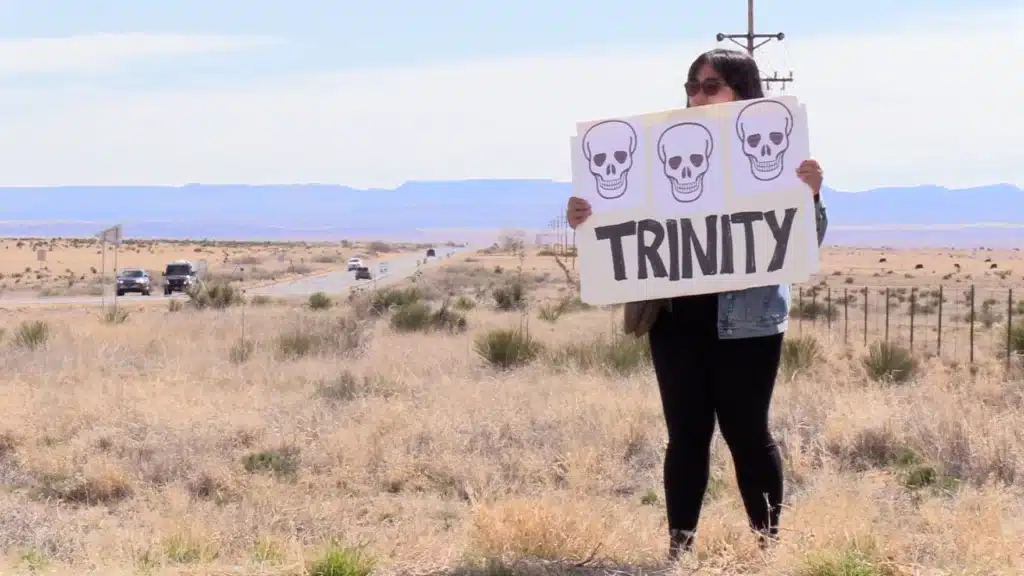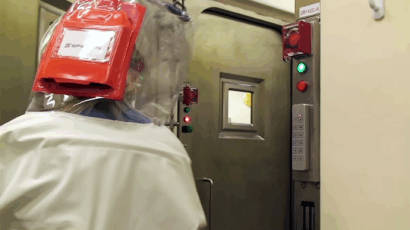Senate passes bill to expand compensation for radiation victims. Will the House agree?
By Allen Hester | March 14, 2024
 A protester near the Trinity nuclear test site. Legislation to extend and expand the Radiation Exposure Compensation Act (RECA) was recently reintroduced in the US Senate after stalling in the House late im 2024. (Credit: Jonny Coker / KRWG)
A protester near the Trinity nuclear test site. Legislation to extend and expand the Radiation Exposure Compensation Act (RECA) was recently reintroduced in the US Senate after stalling in the House late im 2024. (Credit: Jonny Coker / KRWG)
Last Sunday, all eyes were on Christopher Nolan’s Oppenheimer, a film that delves into the history of the seminal “Trinity” test of the first atomic bomb and the complex life of its creator. The film took home seven awards, including best actor for Cillian Murphy’s portrayal of J. Robert Oppenheimer. During his acceptance speech, Murphy said: “We made a film about the man who created the atomic bomb, and for better or for worse, we’re all living in Oppenheimer’s world.”
This week’s spotlight on Oppenheimer, the film, offers Congress a unique moment to address the long-overdue justice for the thousands of Americans who have suffered decades of radiation exposure because of US nuclear weapons testing and manufacturing.
Last week, the Senate approved a significant bill to broaden and prolong the Radiation Exposure Compensation Act, achieving remarkable bipartisan support. However, the bill’s prospects in the House of Representatives remains unclear, leaving communities impacted by the legacy of US national security efforts uncertain about the compensation they rightfully deserve.
Closing the compensation gap. First passed in 1990 with broad support, the Radiation Exposure Compensation Act (RECA) provides compensation to people unknowingly exposed to radiation from nuclear weapons testing and uranium mining. This federal program provides lifesaving benefits to Americans who, since 1945, have suffered directly from radiation exposure-related illnesses caused by the nuclear weapons industry. While RECA covers the scientists and federal employees exposed by their participation in tests like Trinity, it does not include the many thousands of downwinders—families who lived downwind of the Trinity test and were unknowingly exposed to deadly radiation and continue to suffer the consequences.
As it stands, RECA is currently set to expire in June of this year. If this happens, entire communities will lose crucial health coverage and cancer screenings, and many will never get the chance to apply for compensation.
Last week’s passage in Senate of a stand-alone bill extending and expanding RECA represents a pivotal moment in the long-standing effort to repair the injustices faced by those impacted by nuclear weapons testing and manufacturing. Introduced by senators Josh Hawley, a Republican of Missouri, and Ben Ray Lujan, a Democrat of New Mexico, the Radiation Exposure Compensation Reauthorization Act (S. 3853) proposes a comprehensive suite of measures that promise to expand justice to those who have, for too long, borne the invisible scars of our nuclear endeavors. The bill passed Senate by a strong bipartisan vote of 69-30 and President Biden even issued a statement of support for the bill ahead of the vote.
The Senate-passed RECA reauthorization bill seeks to substantially revise and extend the existing RECA program. It proposes a six-year extension and expands eligibility to a broader range of geographic areas affected by nuclear weapons testing, including parts of Idaho, Montana, Colorado, New Mexico, Guam, and all of Nevada, Arizona, and Utah. Given research advancements since RECA’s initial passage in 1990, the new bill also recognizes a wider spectrum of radiation-related illnesses like chronic lymphocytic leukemia and chronic kidney diseases.
The bill will also cover additional communities in Missouri, Alaska, Tennessee, and Kentucky affected by nuclear waste. It further establishes a grant program to study the epidemiological impacts of uranium mining and requires a study by the Government Accountability Office on unmet medical benefits for downwinders and recommendations to address them.
However, despite the passing of the bill last week, the fight for justice isn’t over. The House must now prioritize bringing the legislation to the floor before June.
Resilience amid challenges. Efforts to reform RECA have seen a growing bipartisan support. In July of last year, Senator Hawley secured an amendment to the National Defense Authorization Act for fiscal year 2024 aimed at both extending the geographic reach of the program and expanding the financial and healthcare support for affected communities. Despite support from 61 senators from both major parties, the amendment was unexpectedly removed during the conference process due to concerns over cost, frustrating lawmakers and impacting communities alike.
Senator Hawley called RECA’s removal from the annual military policy bill both a “major betrayal” and “a grave injustice,” adding that it was not the end of the fight. “I will come to this floor as long as it takes… until we compensate the people of this nation, who have sacrificed for this nation, and do not leave them behind.”
This resilience has been reiterated by impacted communities, many of whom will be on the Hill this month to stress the importance of extending and expanding RECA to lawmakers directly. Despite setbacks, many of the activists feel that the stumbling blocks have only strengthened their broader sense of community.
“This has been happening to communities across the country, and we believe we all need to stay united,” said Dawn Chapman, co-founder of Just Moms St. Louis. The organization, which was founded in 2014, jumped into the RECA advocacy effort after it was revealed that radioactive waste buried in St. Louis, Missouri, long after the Manhattan Project was known to pose a threat as early as 1949, but federal officials repeatedly ignored the risks. Again, local communities were not informed of these risks and yet have borne the consequences.
The hidden cost of national security. Assessing the cost of US national security decisions is not an easy task. The United States spends hundreds of billions of dollars on national security programs and is on track to spend $750 billion on modernizing the nuclear arsenal over the next decade. Projected costs for the next era of nuclear weapons are increasing as cost-overruns and significant delays plague new programs.
Congress is all too familiar with the costs associated with repairing the harm caused by national security decisions. The PACT Act, for example, which provides compensation to veterans who have been exposed to toxic substances and diagnosed with health ailments as a result, is estimated to cost $680 billion over the next 10 years, including $300 billion in new health and disability benefits. Nevertheless, Congress did not let the cost stop them from doing what is just, especially for Americans who were harmed in ensuring national security.
Individuals who have unknowingly been exposed to radiation due to nuclear weapons testing, along with their families and communities, have faced numerous costs. Lilly Adams, senior outreach coordinator in the Global Security Program at the Union of Concerned Scientists, argues that it’s not just about money, but about people.
“The cost of chemotherapy, surgeries, and end of life care is already being borne by Downwinders, miners, and those poisoned by the Manhattan Project. The cost of this program is a fraction of what the US government has spent—and continues to spend—on the nuclear weapons that created this mess.”
Under the shadow of Nolan’s Oppenheimer, Congress must acknowledge that the costs associated with the expansion of RECA are not merely additional expenses but are fundamentally linked to the ethical and fiscal responsibilities of maintaining the US nuclear arsenal.
Compensation is a vital step to honor the sacrifices made by communities impacted by radiation exposure and toward a more just approach to national security.
As experts and lawmakers continue to debate US national security strategy and how nuclear weapons fit into that equation, they must not forget the hidden legacy of these weapons. The United States must acknowledge and address the full impact of its military activities, including righting its historical wrongs. Not a single dollar more should be spent on nuclear weapons activities until past injustices are repaired.
Together, we make the world safer.
The Bulletin elevates expert voices above the noise. But as an independent nonprofit organization, our operations depend on the support of readers like you. Help us continue to deliver quality journalism that holds leaders accountable. Your support of our work at any level is important. In return, we promise our coverage will be understandable, influential, vigilant, solution-oriented, and fair-minded. Together we can make a difference.
Keywords: Congress, Nuclear Injustice, RECA, Trinity test, downwinders, radiation exposure
Topics: Nuclear Weapons















